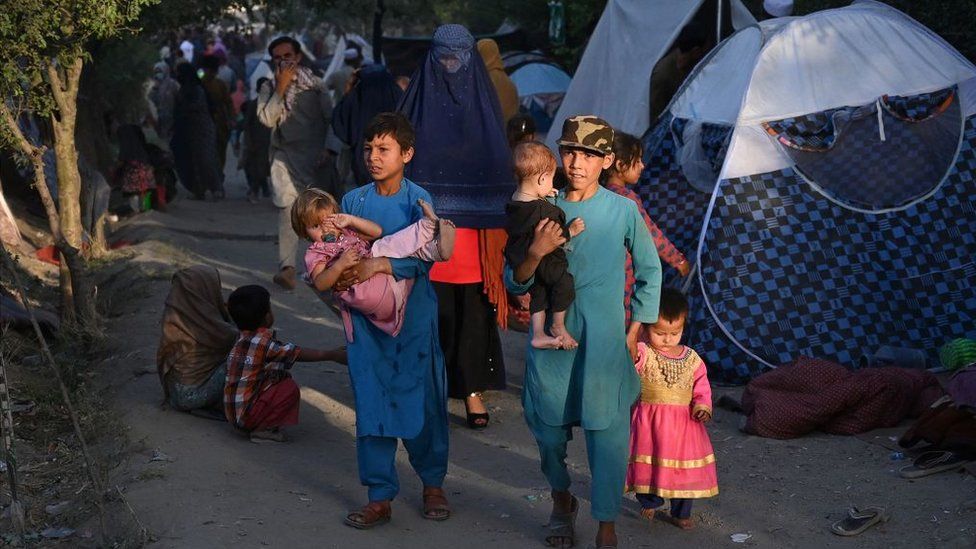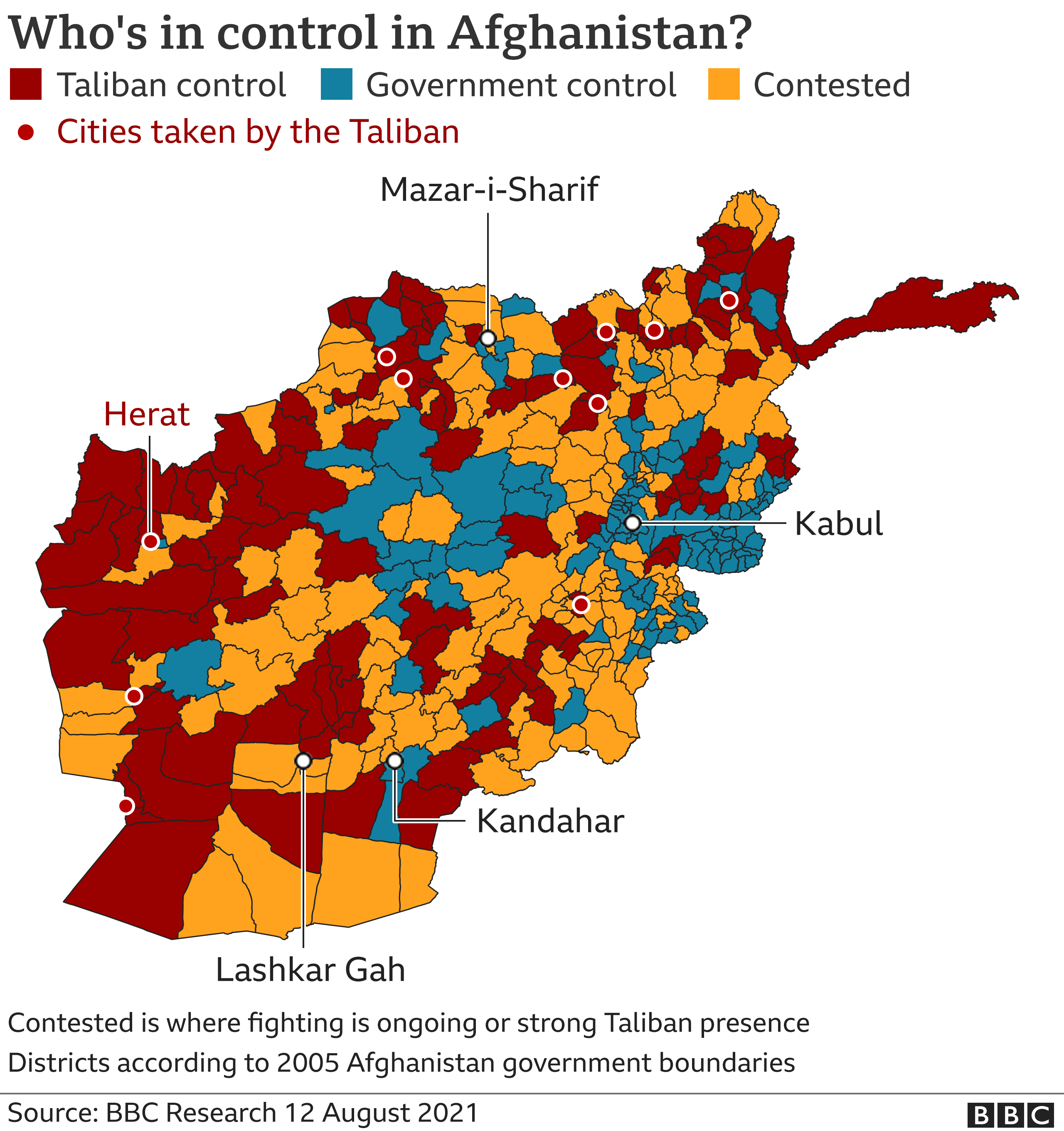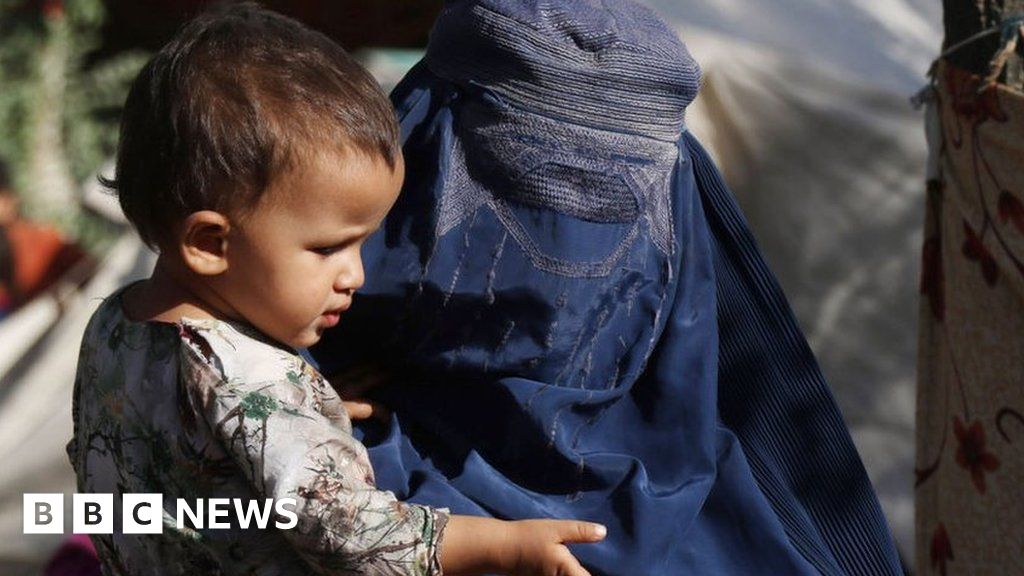
The Taliban have seized the cities of Ghazni and Herat in the same day, taking control of 11 provincial capitals in less than a week.
Taking strategically important Ghazni increases the likelihood the Taliban could take the capital Kabul.
There is also heavy fighting in the second largest city, Kandahar.
The insurgents have moved at speed, seizing new territories almost daily, as US and other foreign troops withdraw after 20 years of military operations.
They now control a third of Afghanistan’s regional cities, in a crushing blow for government security forces.
Taking Ghazni is a significant gain due to its location – the city is on the major Kabul-Kandahar motorway, linking militant strongholds in the south to Kabul.
A provincial council member in the city told the BBC that the Taliban had taken most of the centre, with only a police base on the outskirts controlled by the Afghan security forces.
Herat, in the west of Afghanistan, has been under siege for weeks and on Thursday a regional council member confirmed to the BBC that the city had also fallen to the Taliban, including the governor’s office. Video on social media shows the insurgents running through a central street firing their weapons, and the Taliban flag was seen flying over the police headquarters.
Meanwhile in Kandahar, once the Taliban’s stronghold, heavy fighting was reported and the militants claimed to have taken over its prison and released all of the inmates, although this has not been confirmed.
Prisoners were also freed in the southern city of Lashkar Gah, where there are reports that militants have taken over the police headquarters.
The US embassy in Kabul said it was hearing reports that the Taliban was executing Afghan troops who were surrendering, saying it was “deeply disturbing and could constitute war crimes.”
Escalating Taliban violence, including executions of surrendered Afghan troops, shows a lack of respect for #HumanRights. Don’t erase Afghanistan’s human rights gains of the last 20 years.
— U.S. Embassy Kabul (@USEmbassyKabul) August 12, 2021

More than 1,000 civilians have been killed in Afghanistan in the past month, according to the UN.
Just this week thousands of people from northern provinces have become internally displaced, travelling to Kabul to seek safety.
Makeshift camps have been established on scrubland on the outskirts of the capital, while many others have reportedly been sleeping on the streets or in abandoned warehouses.
“We have no money to buy bread, or get some medicine for my child,” a 35-year-old street vendor who fled Kunduz province after the Taliban set fire to his home told the BBC.
In response to the insurgency, the German government has threatened to end its annual financial support of $500m (£360m) to Afghanistan if the Taliban gains complete control of the country.
Germany has also suspended the forced repatriation of Afghan citizens whose asylum applications have failed. The French and Danish governments said they would follow the same policy.


On Wednesday, Afghanistan replaced its army chief, General Wali Mohammad Ahmadzai, who had only been in the post since June.
Also on Wednesday, President Ashraf Ghani flew to the northern city of Mazar-i-Sharif – traditionally an anti-Taliban bastion – to try to rally pro-government forces there.
Mazar-i-Sharif lies close to the borders with Uzbekistan and Tajikistan, and its loss would mark the complete collapse of government control over northern Afghanistan.
- EXPLAINER: Why is there a war in Afghanistan?
- FEATURE: The displaced people hoping for safety
- ON THE GROUND: Taliban back brutal rule as they strike for power
- PROFILE: Who are the Taliban?
President Ghani held crisis talks in Mazar-i-Sharif with ethnic Uzbek warlord Abdul Rashid Dostum and prominent ethnic Tajik leader Atta Mohammad Noor about defending the city.
Mr Dostum, a veteran commander, was quoted as saying: “The Taliban have come to the north several times but they were always trapped.”
For years, Mr Ghani tried to sideline the warlords in an attempt to boost the Afghan National Army, and now he is turning to them in his hour of need, the BBC’s Ethirajan Anbarasan says. Earlier this week, the president also agreed to arm pro-government militia.

Are you in Afghanistan? Do you have links to Ghazni? Share your experiences by emailing haveyoursay@bbc.co.uk.
Please include a contact number if you are willing to speak to a BBC journalist. You can also get in touch in the following ways:
- WhatsApp: +44 7756 165803
- Tweet: @BBC_HaveYourSay
- Upload pictures or video
- Please read our terms & conditions and privacy policy
If you are reading this page and can’t see the form you will need to visit the mobile version of the BBC website to submit your question or comment or you can email us at HaveYourSay@bbc.co.uk. Please include your name, age and location with any submission.
